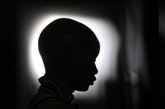 1. Pumzi
1. Pumzi
It's 35 years after World War III, all water sources are radioactive, and the land is infertile. As for the robotic remnants of mankind, they live underground in a high-tech, totalitarian empire with a regime so invasive that when a computer detects you are dreaming, a recorded voice commands, "Take your dream suppressants!"
As for sources of water, one's urine and sweat are gathered and then recycled into drinkable liquids
But is life above ground really so uninhabitable that such measures are necessary? The lovely Asha (Kudzani Moswela), a curator at a virtual natural history museum, believes so until she receives a package with no return address. Inside is soil that seemingly can sustain life. Inspired, she plants an old seed, and it spouts. Her leaders have said that was impossible.
With such information and behavior deemed illegal, Asha, to escape prosecution and save her plant, makes a getaway into a barren, unending desert in search of humidity, the tree of her dreams, and freedom.
This impressive 20-minute allegory directed by Wanuri Kahiu, a Kenyan woman, is part of the 17th Annual New York African Film Festival, where it's one of 13 features and 25 shorts spotlighting the realities and hopes of filmmakers from 18 African countries. This is a continent where making a movie is a still a challenge that can't be easily overcome with daddy's credit card and a degree from NYU.
Presented by The Film Society of Lincoln Center and African Film Festival, Inc., the event's motto is best exemplified by a quote from black historian Saunders Redding: "Freedom is a precarious thing, a sometime thing, a completely unpredictable quantity." And an unshackled cinema can be its best friend.
2. Between the Cup and the Election
Also at the Festival is this spectacularly ambitious student film representing the Democratic Republic of Congo (formerly Zaire). Helmed by Monique Mbeka Phoba and Guy Kabeya Mua, it was filmed in 2006 to spotlight the country's first free elections since its independence.
To explore the importance of this vote, the directors take a roundabout approach, following the lives of the members of the 1974 Congolese soccer team, the Leopards, the first sub-Saharan squad to compete in the World Cup. The Leopards lost to the Yugoslavians, but they still came home as heroes to their nation, "victors" who were exploited by the dictator Mobutu, who ruled Zaire with an iron corruption for 32 years.
The Panthers did receive houses, cars, and jobs, but it was downhill from then on for most. Several died, several are living in poverty, and one is running for office, but their history is in danger of being forgotten.
Since the documentary is only 56 minutes in length and tries to cover a whole lot of ground, the individuals interviewed often blur into each other with just a few exceptions, such as the wife of a player; she explains that her unemployed husband refuses to be filmed because he's embarrassed by his poverty. She has to go around begging.
She is not alone. The screen is filled with the bright colors of indigence: brilliant hand-me-down T-shirts, lustrous trash-filled streets, and energetic kids hoping to become soccer stars themselves. Hope is the message
As the movie nears its end, one of the directors exclaims, "This film had no bridge, but we made it to the end." The other adds, that against all odds, "we have immortalized the Leopards' story." Definitely, here is an offering where content and intentions rule.
3. When You're Strange: A Film about The Doors
Sensationally nostalgic for anyone who was around in the late '60s/early '70s, director Tom DiCillo's compelling paean to Jim Morrison and The Doors zooms by with an immeasurable amoral joy. Self-destruction and tight leather pants have seldom been depicted in such a loving manner.
From Morrison's childhood to his enrollment in film school to the formation of the band to his inspirations (e.g. Nietzsche, Rimbaud, and William Blake), the doc is sort of The Complete Idiot's Guide to The Doors. (But I must say I adore the series. Its volume on Learning Spanish was a lifesaver for me in Mexico.)
As for the footage, much of it never seen before -- including scenes of Morrison drinking and diving nude and drinking and snuggling and drinking and performing -- it's quite gloriously engaging, and clearly shows that Morrison's charisma is still palatable 39 years after his death. That was male beauty.
But you're asking whether When You're Strange deserves to be on the Big Screen as opposed to a Boob Tube cable channel? Well, with Johnny Depp's first-rate narration and many classic concert performances, that depends on how big your Boob Tube is. Sometimes size matters.
